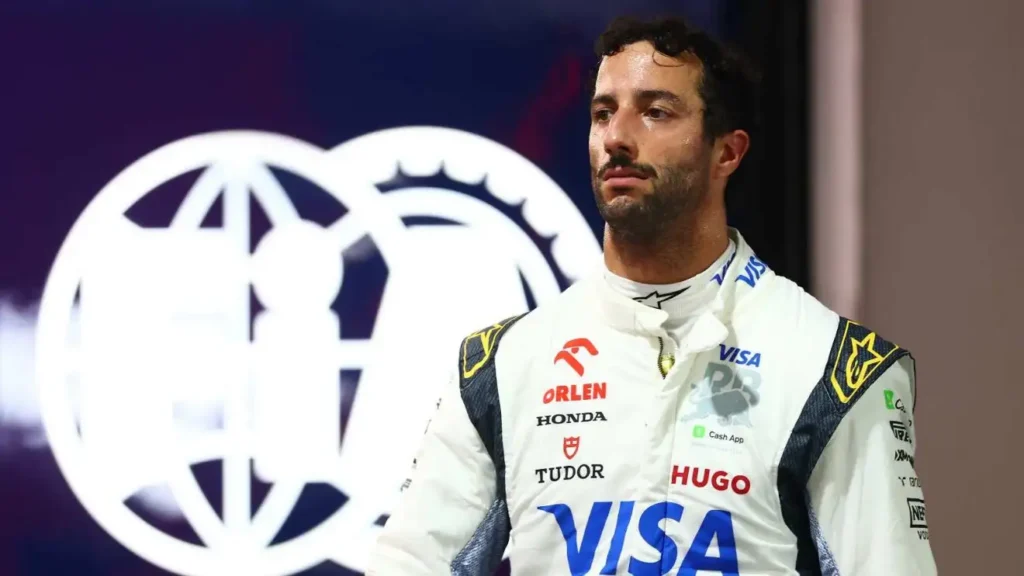“Unraveling Daniel Ricciardo’s Struggles: The Hidden Truth Behind the Racing Bulls Theory That Shocked F1 Fans…see…more
For Formula 1 enthusiasts, Daniel Ricciardo has long been a fan favorite, known for his infectious grin, daring overtakes, and race-winning prowess. However, the past few years have seen a dramatic shift in Ricciardo’s fortunes, leaving fans puzzled and critics questioning his future in the sport. Adding fuel to the fire is a controversial new theory making waves in the F1 community: the “Racing Bulls Theory.” Could this hypothesis unlock the truth behind Ricciardo’s recent struggles, or is it just another conspiracy adding to the drama of Formula 1? Let’s dive into the details.
Daniel Ricciardo burst onto the Formula 1 scene with HRT in 2011 before securing a seat at Toro Rosso and later graduating to Red Bull Racing in 2014. With the energy drink giant’s team, Ricciardo quickly established himself as a force to be reckoned with. In a season dominated by Mercedes, he clinched three victories and often outperformed four-time world champion teammate Sebastian Vettel, cementing his status as a future title contender.
From 2014 to 2018, Ricciardo amassed an impressive tally of seven race wins with Red Bull, known as the “Racing Bulls” due to their aggressive racing ethos. His audacious moves, such as his iconic late braking “lick of the stamp and send it” overtakes, won him legions of fans worldwide. However, cracks began to appear in 2018 as Red Bull shifted focus to its emerging young talent, Max Verstappen. Feeling sidelined, Ricciardo made the bold decision to leave for Renault, a move that many now consider the beginning of his downward spiral.

Ricciardo’s switch to Renault in 2019 was met with optimism, but the reality was far from rosy. Although he secured two podium finishes with the French outfit, the car’s performance and reliability were inconsistent, and he struggled to replicate his Red Bull form. The move to McLaren in 2021 brought new hope, especially with the team on an upward trajectory. Yet, despite a fairy-tale victory at Monza in 2021—McLaren’s first win in nearly a decade—Ricciardo’s overall performance was underwhelming.
The Racing Bulls Theory posits that Ricciardo’s success was intrinsically tied to the culture and engineering ethos of Red Bull Racing. The team’s aggressive approach to car development, combined with Ricciardo’s natural flair, created a perfect storm that allowed him to shine. Away from this environment, the theory suggests, Ricciardo has struggled to adapt to different teams’ philosophies and machinery.
According to proponents of the theory, Red Bull’s cars during Ricciardo’s tenure were tailored to suit his unique driving style: late braking, quick directional changes, and precision in high-speed corners. In contrast, Renault and McLaren’s cars required a more conventional driving approach, demanding greater adaptability. Critics argue that Ricciardo’s inability to adjust has exposed a potential limitation in his skillset.
The theory also points to the psychological aspect of Ricciardo’s career. At Red Bull, Ricciardo thrived in a supportive yet competitive environment. However, the constant pressure to prove himself at Renault and McLaren may have eroded his confidence, further hampering his performance.
In recent interviews, Ricciardo has acknowledged the challenges he’s faced but remains optimistic about his future. “It’s been tough,” he admitted. “But I’ve learned a lot about myself and what I need to succeed. Sometimes, you’re in the right place at the right time, and other times, you’re not. That doesn’t mean you stop fighting.”
Ricciardo’s recent return to Red Bull’s sister team, AlphaTauri, as a mid-season replacement has reignited speculation about whether he can rediscover his mojo. Early indications suggest that Ricciardo’s familiarity with Red Bull’s engineering philosophy might give him the boost he needs to reignite his career.
As the Racing Bulls Theory continues to spark debate, one thing is clear: Ricciardo’s journey is far from over. With F1’s ever-changing landscape, a single breakthrough could catapult him back to the top. Whether or not the Racing Bulls Theory holds water, it underscores the intricate interplay of talent, machinery, and environment in Formula 1.
Fans and pundits alike will be watching closely as Ricciardo navigates the next chapter of his career. Will he silence the doubters and prove that his talent transcends any team’s philosophy? Or will the Racing Bulls Theory become an enduring narrative of what might have been? Only time will tell.
Leave a Reply